Top Rankings
Uintah School District ranks among the top 20% of public school district in Utah for:
Category
Attribute
Community Size
Largest student body (number of students) (Top 1%)
For the 2025 school year, there is 1 public preschool serving 204 students in Uintah School District.
Public Preschools in Uintah School District have a diversity score of 0.37, which is less than the Utah public preschool average of 0.48.
Minority enrollment is 22% of the student body (majority Hispanic), which is less than the Utah public preschool average of 31% (majority Hispanic).
Overview
This School District
This State (UT)
# Schools
13 Schools
408 Schools
# Students
6,942 Students
195,137 Students
# Teachers
291 Teachers
9,057 Teachers
Student : Teacher Ratio
23:1
23:1
District Rank
Uintah School District, which is ranked within the bottom 50% of all 153 school districts in Utah (based off of combined math and reading proficiency testing data) for the 2020-2021 school year.
The school district's graduation rate of 87% has increased from 77% over five school years.
Overall District Rank
#95 out of 154 school districts
(Bottom 50%)
(Bottom 50%)
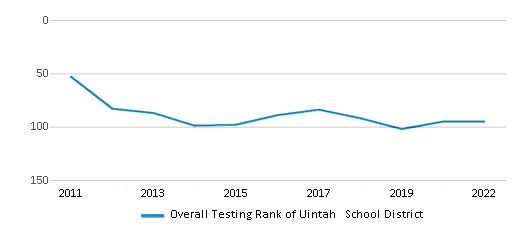
Math Test Scores (% Proficient)
(20-21)34%
39%
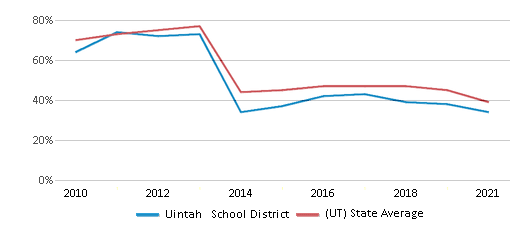
Reading/Language Arts Test Scores (% Proficient)
(20-21)34%
43%
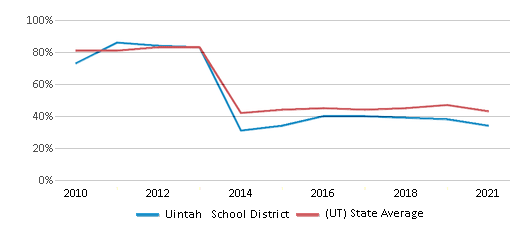
Science Test Scores (% Proficient)
(20-21)42%
45%
Graduation Rate
87%
88%
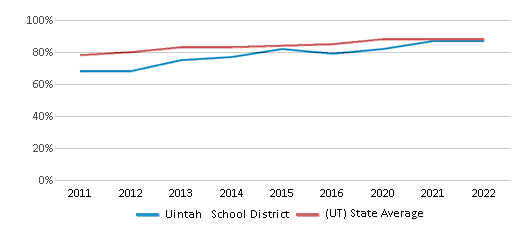
Students by Ethnicity:
Diversity Score
0.37
0.48
# American Indian Students
456 Students
2,004 Students
% American Indian Students
7%
1%
# Asian Students
22 Students
2,792 Students
% Asian Students
n/a
2%
# Hispanic Students
767 Students
41,494 Students
% Hispanic Students
11%
21%
# Black Students
38 Students
2,695 Students
% Black Students
1%
1%
# White Students
5,433 Students
134,941 Students
% White Students
78%
69%
# Hawaiian Students
28 Students
3,551 Students
% Hawaiian Students
n/a
2%
# Two or more races Students
198 Students
7,647 Students
% of Two or more races Students
3%
4%
Students by Grade:
# Students in PK Grade:
204
16,151
# Students in K Grade:
487
23,940
# Students in 1st Grade:
474
24,978
# Students in 2nd Grade:
517
26,403
# Students in 3rd Grade:
513
26,290
# Students in 4th Grade:
505
26,559
# Students in 5th Grade:
540
27,209
# Students in 6th Grade:
492
18,075
# Students in 7th Grade:
525
1,029
# Students in 8th Grade:
532
1,462
# Students in 9th Grade:
563
1,079
# Students in 10th Grade:
566
570
# Students in 11th Grade:
515
560
# Students in 12th Grade:
509
832
# Ungraded Students:
-
-
District Revenue and Spending
The revenue/student of $11,717 is higher than the state median of $10,732. The school district revenue/student has stayed relatively flat over four school years.
The school district's spending/student of $12,135 is higher than the state median of $10,829. The school district spending/student has stayed relatively flat over four school years.
Total Revenue
$81 MM
$7,309 MM
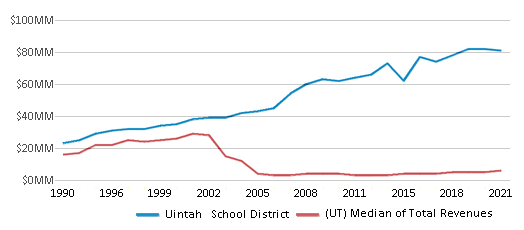
Spending
$84 MM
$7,375 MM
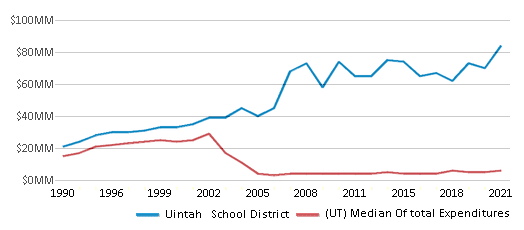
Revenue / Student
$11,717
$10,732
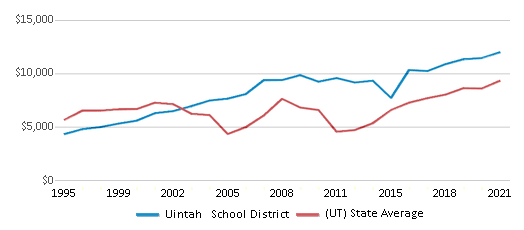
Spending / Student
$12,135
$10,829
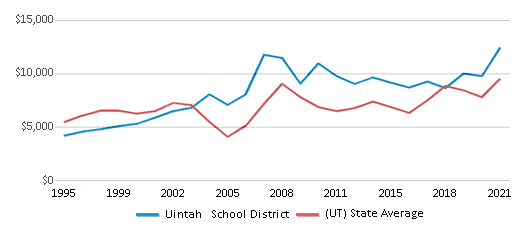
Best Uintah School District Public Preschools (2025)
School
(Math and Reading Proficiency)
(Math and Reading Proficiency)
Location
Grades
Students
Rank: n/an/a
Uintah Specialized Preschool
Special Education School
250 S Vernal Ave
Vernal, UT 84078
(435) 781-3125
Vernal, UT 84078
(435) 781-3125
Grades: PK
| 204 students
Recent Articles

What Is A Charter School?
Explore the world of charter schools in this comprehensive guide. Learn about their history, how they operate, and the pros and cons of this educational innovation. Discover key facts about charter schools, including admission policies, demographics, and funding, as well as what to look for when considering a charter school for your child.

10 Reasons Why High School Sports Benefit Students
Discover the 10 compelling reasons why high school sports are beneficial for students. This comprehensive article explores how athletics enhance academic performance, foster personal growth, and develop crucial life skills. From improved fitness and time management to leadership development and community representation, learn why participating in high school sports can be a game-changer for students' overall success and well-being.

February 05, 2025
Understanding the U.S. Department of Education: Structure, Impact, and EvolutionWe explore how the Department of Education shapes American education, from its cabinet-level leadership to its impact on millions of students, written for general audiences seeking clarity on this vital institution.





